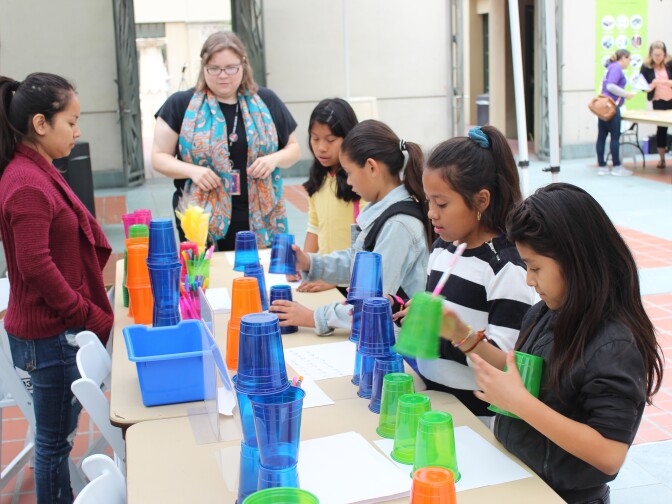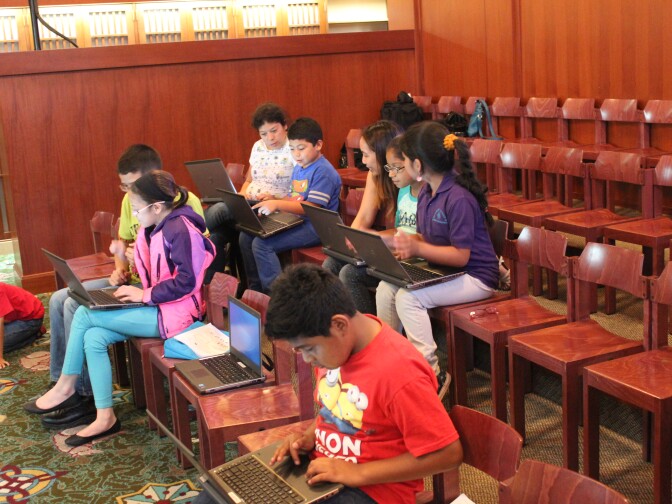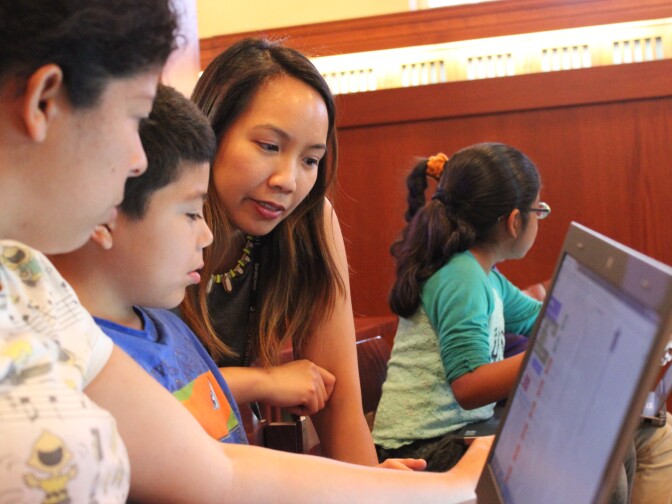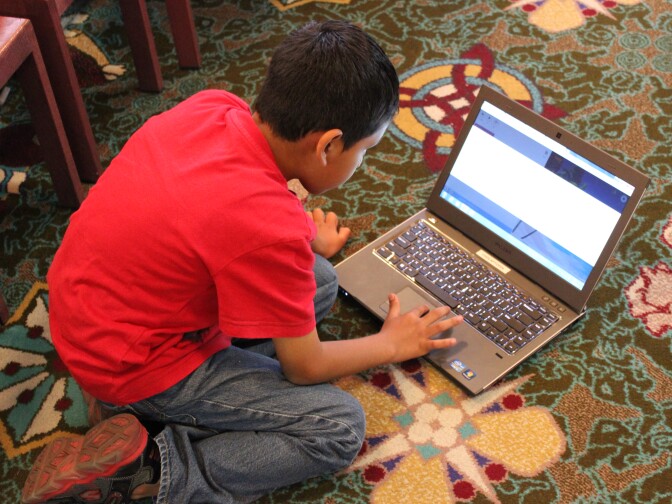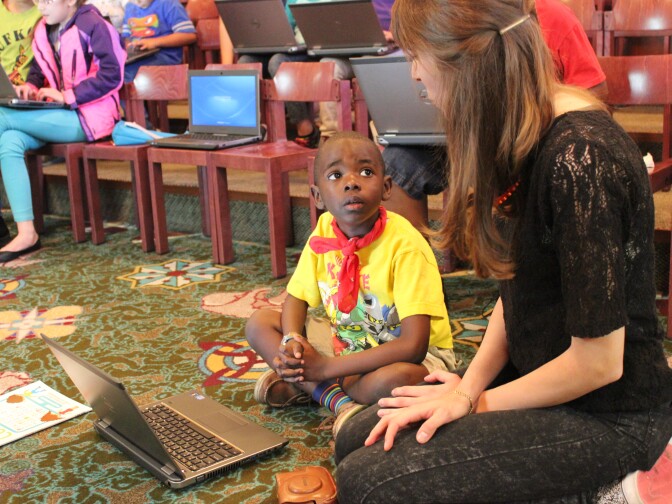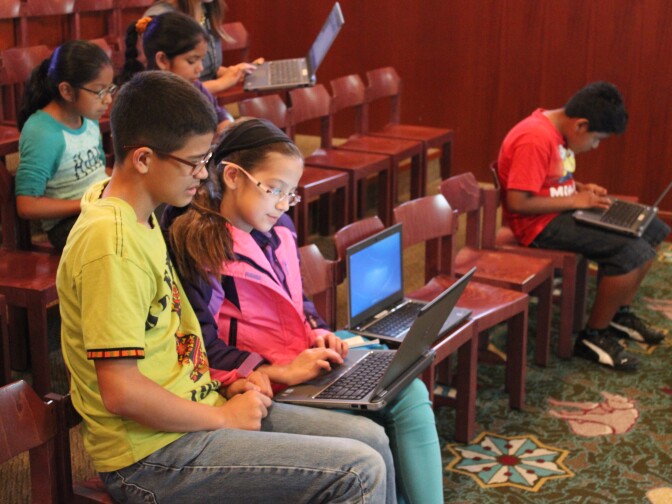Truth matters. Community matters. Your support makes both possible. LAist is one of the few places where news remains independent and free from political and corporate influence. Stand up for truth and for LAist. Make your year-end tax-deductible gift now.
This archival content was originally written for and published on KPCC.org. Keep in mind that links and images may no longer work — and references may be outdated.
New LA libraries program turns 'story time' into hands-on 'coder time'
On a recent afternoon at the central library in Los Angeles, nine-year-old Perla Hernandez typed on a provided laptop, working on a drawing game called “Phenomenal Turtle”. Getting the turtle to move across the screen required her to break down big complex problems into small sequential steps.
In other words, the nine-year-old girl was learning to code.
She was one of about a dozen elementary school children gathered at a class called “coder time” for elementary and middle school kids.
“Historically we’re the place that offers opportunities,” said children’s librarian Joanna Fabicon, who started the project. “I named it coder time because I would love coding to be as ubiquitous in libraries as story time."
Libraries – the lands of hushed voices and dusty stacks – are transforming into computer science hubs for children.
A new report by the Pew Research Center, “Libraries at the Crossroads,” finds that libraries are responding to the public demand for skills like programming and technology literacy, which are becoming increasingly important in the workplace.
Code.org, a non-profit dedicated to expanding access to computer science, said more than 80,000 computer jobs are open in California right now. In the next five years, there will be a million more jobs than students nationwide. Libraries across the country, from Fayetteville, NY and Denver, CO to Sonoma, CA, are responding.
Coder Time began at the L.A.'s central library with a grant from the Eureka leadership program. To reach more children, Fabicon formed a partnership with the afterschool program L.A.’s Best, which rolled out the curriculum to 160 children at eight LAUSD schools.
Technology advocates said these kinds of programs allow kids to become creators, rather than just consumers of media.
The idea that libraries are no longer just about housing books, but about creating access to technology is catching on. Nate Stone is the program coordinator for the ideaLAB at Denver Public Library, recently recognized with a national innovation award for its programming camps for teens. When he first offered coding classes to kids, more than 200 signed up.
“I don’t know if you’ve ever been in a 600 square foot room with 15 sweaty 12-year-olds,” he laughed. “But it quickly got very unpleasant and crowded.”
According to Stone that’s a good problem to have, because the library helps put coding skills into the hands of kids who might otherwise not get them. There is no shortage of coding and game development camps, he said, “but they often cost $700 to $2,000 for a week, which puts it out of reach for a lot of families.”
Libraries may also lower the bar for entry when it comes to gender and ethnicity. Only a fraction of high school students who take computer science classes are women, Latino, or African American. Libraries, on the other hand, traditionally attract lots of girls. That's because girls are not intimidated to come to the library, said Brooke Sheets, a children's librarian at L.A. library's central branch.
“Nobody makes them feel uncomfortable here,” Sheets added, “so it’s a great chance for them to collaborate and explore, without any of the traditional barriers that are keeping girls out.”
More than half the kids in Hernandez's class were girls, a ratio most computer science programs can only dream of.
At the end of the lesson she presented her game to the group. (Here's an example of the finished product, developed on the kid-friendly programming platform Touch Develop.)
The kids watched as a small green turtle moved quickly across the screen, filling it with a rainbow of intricate pop-art patterns, earning a big round of applause.
Library programs for kids and teens
- L.A. Public Library STEAM initiative
- Scratch Coding at Robertson Branch Library
- North Hollywood Teen and Children Robotics Club
- Pasadena Library Teen Coding Club
- Coding with Cups at Venice Branch Library
- Squishy Circuits Science Storytime and Workshop at West Los Angeles Regional Library
Local coding groups and meetups for children and teens
Bilingual materials
- Educational materials in English and Spanish on coding and computer science aimed at librarians, teachers, and parents
Online coding resources
- Guide to coding resources from the American Library Association for Children
- Coding for children ages 7 and up: scratch.mit.edu
- Coding for young children (ages 5-7): scratchjr.org
- Microsoft’s TouchDevelop education program
- Google’s CS First program
- Pinterest board with 60+ coding resources for kids
- Coding for all ages: code.org



